If there is a train to Manomet, then I was on the train to Manomet when it happened. I was drinking straight vodka from a hip flask offered by a gypsy who told me it would make my dreams go away. Because I was plagued by dreams of former lovers sadder than poetry or love songs, and because I was at an age where it didn’t make sense for my lovers to be dying, I took the gypsy’s drink without question.

The dreams did not stop after the vodka, but the gypsy was gone, along with my wallet and cufflinks. My neck had been stiff for days, I was burning up with fever. I decided to call an old friend because I wanted to hear her voice again, even if she hung up fast when I said hello. When she did not answer I went in search of the meal car.
There were little round tables draped in cheap gingham, fistfuls of lily planted in squat glass vases at the center of each. Far on the left the vendor perched behind the low counter with a leather Bible open on his lap, reading glasses down near the tip of his nose. He pretended I wasn’t there.
I asked if he had any sandwiches. He closed his book very slowly so I could hear the pages touch. The reading glasses had a terrible magnifying effect. When he didn’t say anything, I asked him again did he have any sandwiches.
The train passed a string of shirtless boys sitting trackside, beating the ground with sticks. Some were shouting, hurling pinecones and fist-sized rocks at the train; others sat very still, serious-faced, hawkish downturned noses made black with dirt and grease, eyes glinting with heat.
“Did you hear me?” the vendor said. “Hello? Hello?”
****
The summer after graduation I only took calls from my girl in San Jose. My parents were on sabbatical in Bangladesh, my old roommates had consulting jobs in New York and Seattle, or else they were playing farmhand or teacher in places like Montana and Wyoming, because they’d lived their whole lives in New England and felt stifled.
With a bit of savings, I’d managed a three-bedroom walk-up near Central Square, above the blinking neon of the all-night convenience, across from a playground famous for its razorblades—in the sandbox, on the slide, gleaming grins of razor keen to carve the shins of unsuspecting children. Usually it was overrun with kids in sleeveless jerseys, flashing in the sun like junkyard scrap. They ran around like animals. They didn’t care about razors, and no one cared that they didn’t care.
I shared the place with two other guys, both working specialized lab jobs at the university. They wanted to work in pharmaceuticals, or else software engineering, and they had very strong opinions about innovation. They’d gone to school in California and they brought home free bottle-openers and shot glasses from places called Synageva and Genzyme. Their teeth were furiously clean, their smiles vicious flashbulb detonations.
At night they smoked up the deck. I joined them once but their words stopped my ears like cotton. “So you’re writing, huh?” the one called Win said. He squinted like he was trying to make something out in the dark.
“Two thousand words per day,” I said. Someone in the triple-decker next door was cooking pot stickers. The whole block smelled of pork.
“That’s not too much,” Win said, winking at Pierre. Pierre pinched out his cigarette and ground it to ash. I took one of Win’s cigarettes and lit it.
“We’re just screwing with you,” Pierre said. “Hey, Win—maybe he’ll write about us. Come on, take a good look.” He grabbed Win by the shoulders. “You can be our biographer when we break the Valley. We’ll develop an app that makes fat people invisible. We’ll sign over the rights tonight. All you have to do is ask.”
“All you have to do is ask!” Win hooted, and the two of them laughed up a storm. “For fuck’s sake why does it smell like pork all the time?”
“Pot stickers,” I said. “The little Vietnamese woman next door is making pot stickers again.”
****
Miss Kendra ran the all-night convenience and lived in the small apartment below ours. Her face made men anxious and sad. She kept a Rottweiler called Xander, and after sundown he rubbed against the chain-link fence like he had an itch. The night jangled.
Miss Kendra was always threatening to put him down. He’s old, she’d say. He’s in such horrible pain. He’s a pain. He whimpers when it thunders, barks at odd hours, and when he’s content, he purrs like a wind-up machine.
The tenant upstairs hammered copper pots all day. Because I had nowhere to be, and because any distraction promised deliverance, I lay on the sofa and listened to the man’s hammering. Sometimes he swore loudly and hurled his toolkit across the room, his little hammers tap-dancing across our ceiling. I imagined him a dead man sent to haunt the three of us that summer. Win and Pierre sometimes took a broom to the ceiling, slammed the butt end into the cracked plaster and shouted rude things. The dead man shouted ruder things straight back.
****
I had a girl waiting for me in San Jose. We spent hours each night chatting about her work at her father’s law office, and I imagined her lounging on her father’s day bed with the clean cream-colored sheets, the one by the windows overlooking the cabana, the pool, the jacaranda trees. In the daydream she is wearing a little pink negligee tucked to form—the sort of thing she’d never wear—and her father doesn’t exist. We’d joke about the names she had to enter into her father’s databases. She’d give me three and I’d have to guess the fake.
“I bet you’re scaring up the men of San Jose,” I’d say. “What’s a pretty girl like you doing in San Jose?”
We traded lines we’d learned from movies and songs. It was a game. Everything that summer was a game.
“You know he’d give you a job,” she’d say. It was true, her father and I got along. He told me stories about his first wife, and his second, like it was something I wanted to hear. He owned several apartments around town, and he always said we could take whichever one we liked. They all had big south-facing windows, lots of light, never any shadows. “We could start everything right now.”
After hanging up I’d watch the moths bat against our kitchen light. Not the pretty kind with marbled wings but the dull thin ones with cigarette-bodies. I repeated my lines to the kitchen table: What’s a pretty girl like you doing in San Jose? My lips felt swollen and thick, wax dummy lips. What’s a pretty girl like you?
When we first started seeing each other, my girl began skipping Sunday mass. I felt triumphant, as if I’d stolen something from her, from her father, from his grinning bearded face with the jubilant Father Christmas eyes.
But I’d gone with her, once, to the church near campus, the one with the bells that tolled our days every quarter hour. It was a small side chapel across the graveyard marked with bright Roman crosses and gray-faced tombs. We entered through arched double doors heavy with shellac and religion and good wood. Under the low-vaulted ceiling, rows of cheap chairs padded with imitation leather; a dais at front; a dimpled disk of holy water, shining like a coin, and little papers tucked behind the chairs like bibs, halved to fit the thin wood slits in back.
Along the wall were placards showing Jesus in the various stages of his crucifixion. The only one I read was labeled “VII: Jesus Falls a Second Time,” and a man with a cat-o-nine stands with his arms raised, whips flailing like a mop head.
There was furious talk of grace, redemption, rebirth, but soon the words went cheap and limp as guppies. There were women in overlarge sunhats, fanning themselves with prayer sheets, and tired husbands resting on piled chins, and boys and girls in good Sunday clothes with shiny black shoes and copper buckles.
My girl whispered something in my ear and smiled, but I couldn’t hear anything at all. I wanted redemption, like anyone else.
****
There was a robbery at the convenience one night. The hooded man shot the blinking neon sign behind the counter as Miss Kendra counted fives from the register. Before leaving, he shot the head off the life-sized Virgin Mary in the corner, a tea light burning in her outstretched palm. The neighborhood froze up.
Miss Kendra was inconsolable. She’d spent years preparing for the moment. “I’ll look him in the eyes,” she told me once over Chablis on her back porch one night when Win and Pierre were at a party in Boston, dressed like comic book villains. “I’ll smack him with my cane and tell him to scram!” With the last word, she popped her face forward, fierce and powdered, like a jack-in-the-box. “That’s what I think about at night. I think about robberies.”
When the moment arrived, she lost it.
The next day, I brought Miss Kendra a bouquet of lilies wrapped in orange tinsel that caught the light like fire. “How lovely,” she said quietly, as if truly in awe of the display. Perhaps she was. The whole thing was still a mystery to her. She placed the lilies in a tall cobalt vase on the buffet by the open window, and in the afternoon breeze they seemed to whisper of all the good things headed our way.
I spent a lot of time that summer at Miss Kendra’s but I know less about her than anyone. We sat and talked about the weather and old lovers, and still I don’t know where she’s from or what her full name is or why she runs a convenience store. I don’t mind.
Win and Pierre left after the robbery, but Pierre left first. For several weeks, Win and I sat around packing and unpacking Win’s boxes. In the end he decided to leave everything except for one suitcase of good clothes. We rearranged the living room furniture—most of which belonged to the previous tenant. Some nights we pretended we were friends and watched late-night television together.
Win and Pierre had jobs lined up in the Valley at competing start-ups, and I’d agreed to a job in San Jose, at the law firm. I imagined the family barbeques: wives furiously coiffed, glibly drunk, winsome; children loud and red-cheeked—water guns, horseshoes, archery; wine in dark bottles, a pool, marimbas, club music, everything smelling faintly of chlorine and char, little grinning hot dogs roasting on the grill. I said I’d be in San Jose in one week’s time.
In college, my girl never liked parties, though she attended many. Sometimes she’d tell me about them, bring me along, other times I’d see photographs later, another man tangled round her, but I never said anything about it, and she never said anything, either. Sometimes I wondered if I should’ve said something, if that’s what both of us were looking for, in the end.
I hadn’t told Miss Kendra yet that I was leaving. I put an ad for new roommates in the local paper, but she said it didn’t matter. She thought I’d be there through the fall, even the winter. She said, “Take as much time as you need—you’re doing the real work,” and gave me a very serious look before we burst out laughing. She thought we had time. There wasn’t any hurry—that wasn’t Miss Kendra’s way.
After I left Miss Kendra, I started riding trains. I went from Boston to Minneapolis to Tucson and Carson City. It didn’t matter where. I slept and woke to the land speeding under me. But I don’t mean it like that—it wasn’t an adventure. It wasn’t anything holy, or beautiful, or fun. Sometimes I thought I heard the dead man hammering pots. I’d wake baptized in sweat, with the feeling I might never shake him. But I did.
It was only after leaving that I wondered if it was Miss Kendra or Xander I’d heard at night, wandering the yard, running her hands along the fence, keeping everyone up.
****
The sandwich vendor and I eat chicken pesto sandwiches. Outside, the country: curious, hay-colored, implausible—a child’s drawing of the world. He asks do I believe in God.
“Read me something,” I say, nodding to the leather Bible. The gilt on the cover winks in the light. “I’m open to conversion.”
“I only just found it—a beautiful woman left it behind.”
“Oh yeah?”
“She had this big white sunhat,” he says. “Big white sunhat and killer legs. Ran off at Rye but look what she left me.” He raps the leather front. I think to ask if he saw her face. What of hooked noses, cheeks marled with freckle? What of unbeautiful girls and their unwise admirers? “I’ll keep it forever, remind me of that beautiful woman.”
The train stops. We’re on the inland branch, and several hundred feet to the east a juniper hedge downslants to ravine. Three harried men in oil shirts rush the compartment. The sandwich vendor, accustomed to such interruptions, does not make anything of it until the shouting begins. The men scuttle through again, faster this time, and order an evacuation.
An accident—whispered the way schoolgirls gossip of boys, excitedly, and not without trepidation. They found a train ticket in the front pocket, a wallet, cufflinks, and soon they are saying my name. I start to say how my wallet was stolen, how I am still alive. I ask after the victim, but I already know how the scene will play, and anyway they wave me off, tell me to take a seat in the next car. “Wait your turn,” one man says.
Instead I find the bathroom between cars. I spit into the toilet bowl and rinse my hands. I take too many towels from the paper towel dispenser, and more after that, and more, until it’s empty. I line the sink, perfectly sized, and fill it with water. In the mirror I count the blue smudges under my eyes, the gold pinpricks of stubble. The sound of the whispering men fills me with despair. I don’t know if my fever’s better or worse. I’ve stopped knowing the difference. I think of Jesus emerging from his tomb, the flood of light, mean and sharp, and the horrible shock of sky after three days in the dark.
Unthinking, I hold my head under water.
There was only one other time in my life that I felt I was drowning. I was very young and there were three older boys and we were trying to win the attention of Becky Meyers, the lifeguard. She wore an orange one-piece with a white cross on her midsection. Mornings her boyfriend often came by with coffee. Years later he’d die in a wreck (black ice; visiting his newest paramour, not our Becky), but at the time we were envious of his power over her, the way she looked distractedly from the pool, from us, when he ran late, the way she tapped her flip-flopped feet on the middle rung of her watchtower. Even underwater we heard the tapping. It haunted us, sang ceaselessly of her love for another man.
One day we said we’d pretend to drown, all at once. She wouldn’t know what to do. Once she got in the water, we’d take turns: one of us would exaggerate his struggle, and at her touch revive, then the next, and the next, and so forth. But when the day arrived, I was the only one there. Becky waved and smiled. As I walked past the watchtower I caught the scent of her melon sunscreen. She glistened like a pearl. She said, “I’ll have to watch you extra hard today.”
I don’t remember what happened directly before or after, but I remember the diving board, and the moment I decided to stop breathing. My eyelids danced with blue light. The floor came from under me, everything moving very slowly, I thought I heard tapping. Then her arms around me, every bit as tender as I’d dreamed. And the vomiting, the blinding sunny concrete, the wet trunks slipping, her hands on my sternum softly pressing, and the perfect circle of ambulance window, traffic parting like the Red Sea, the siren overhead and the noise everywhere, not receding or swelling like I’d always heard it, but good and constant. And me, in the ribcage of the beast, rushing toward St. Marguerite’s, left with the memory of her arms, still tender and burning, the happiest I’d ever felt, the happiest I would ever feel.
In addition to being the Gold Coaster’s undergraduate editor and concentrating in English, Chris Alessandrini somehow finds time to pursue his own writing projects. His story Charade won the David Rice Ecker Short Story Prize for Freshmen in 2012. He hails from Lexington, Massachusetts, and is fortunately rarely found on trains.

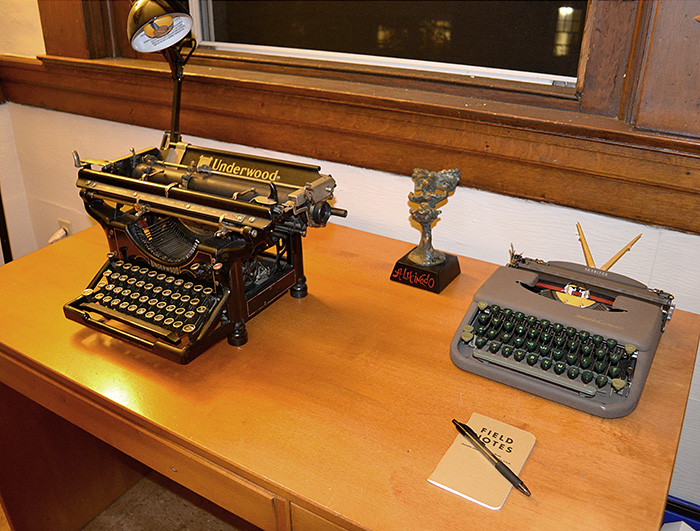
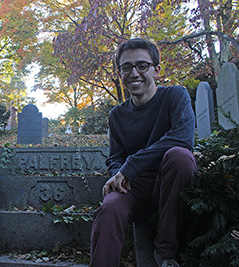

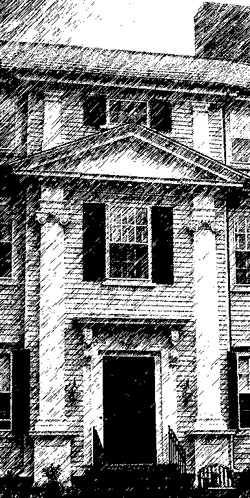
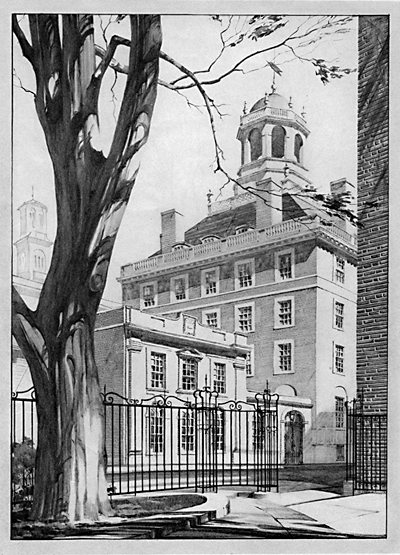

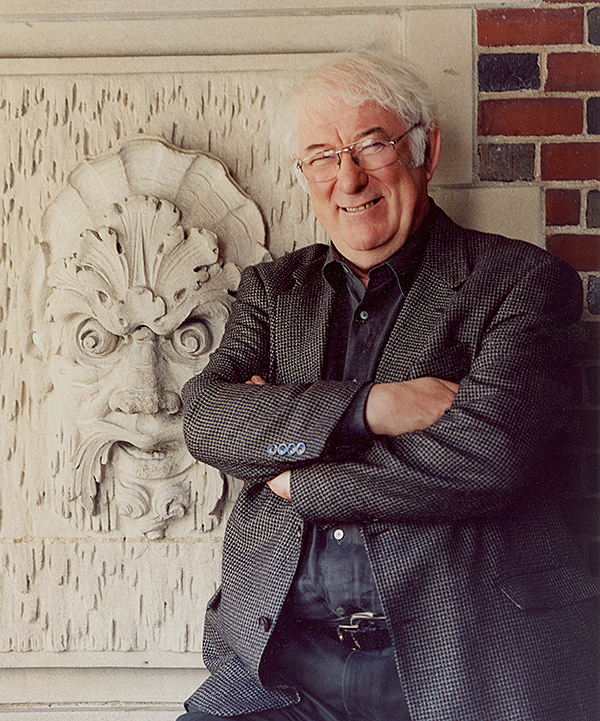 Seamus in front of the B-entry Fountain. Photo: courtesy Sean Palfrey
Seamus in front of the B-entry Fountain. Photo: courtesy Sean Palfrey